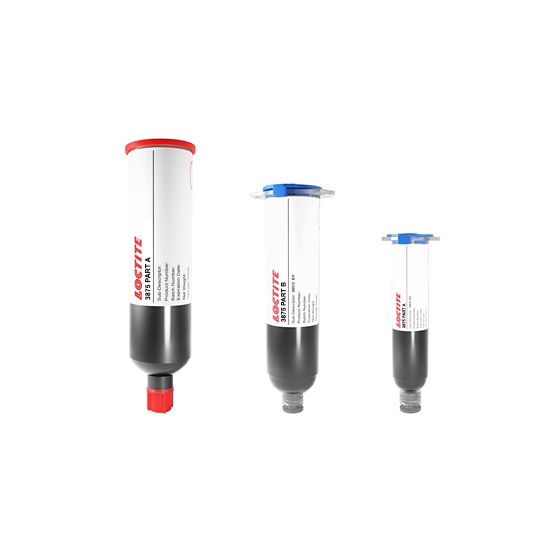LOCTITE 3875
Harmonization Code : 3906909090 | Acrylic polymers in primary form Others>Others
Main features
- Two components
- Thermally conductive
- For transistors, rectifiers and power devices
Product Description
LOCTITE 3875 bead-on-bead, thermally conductive adhesive is designed to thermally couple and structurally bond heats sinks to heat dissipating electronic components. It is formulated to cure when the two components come into contact with one another, requiring no primer or heat.
LOCTITE 3875 is a two component acrylate, that is easy to use and can cure at room temperature. It is typically used for thermal management in transistors, rectifiers and computing applications such as memory chips, chipsets and gpu assemblies.
Cure Schedule
- 24 to 72 hours @ 23°C , 50% RH
Technical Specifications
| General Properties | |
| Specific Gravity Specific Gravity Specific gravity (SG) is the ratio of the density of a substance to the density of a reference substance; equivalently, it is the ratio of the mass of a substance to the mass of a reference substance for the same given volume. For liquids, the reference substance is almost always water (1), while for gases, it is air (1.18) at room temperature. Specific gravity is unitless. | 1.7 |
| Thermal Properties | |
| Glass Transition Temperature (Tg) Glass Transition Temperature (Tg) The glass transition temperature for organic adhesives is a temperature region where the polymers change from glassy and brittle to soft and rubbery. Increasing the temperature further continues the softening process as the viscosity drops too. Temperatures between the glass transition temperature and below the decomposition point of the adhesive are the best region for bonding. The glass-transition temperature Tg of a material characterizes the range of temperatures over which this glass transition occurs. | 28 °C |
| Thermal Conductivity Thermal Conductivity Thermal conductivity describes the ability of a material to conduct heat. It is required by power packages in order to dissipate heat and maintain stable electrical performance. Thermal conductivity units are [W/(m K)] in the SI system and [Btu/(hr ft °F)] in the Imperial system. | 1.75 W/m.K |



